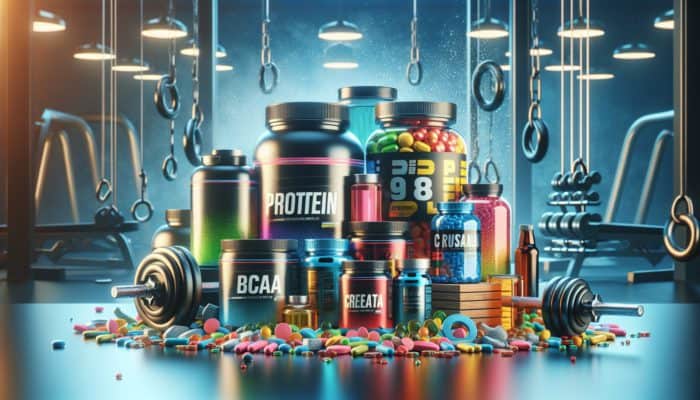Discover the Immune-Boosting Power of Zinc Supplements for Enhanced Athletic Performance
Zinc is more than just a trace mineral; it plays a critical role in enhancing the immune system of athletes. For those athletes who consistently push themselves to their limits, understanding the essential role of Zinc is crucial for not only achieving optimum performance but also for maintaining robust health. Incorporating Zinc supplements for immunity in athletes can offer a significant advantage in ensuring peak health, particularly during intense training periods and competitive events that challenge the body.
Unraveling How Zinc Enhances Immune Function for Athletes' Success

Zinc is a crucial trace mineral that supports a variety of physiological functions, especially those that regulate immune system performance. Athletes involved in rigorous physical activities have an increased requirement for this essential nutrient. The presence of zinc is vital for the growth and activation of immune cells, including T lymphocytes and natural killer cells, which are essential defenders against harmful pathogens. Additionally, zinc is crucial for cytokine production—important proteins that facilitate communication among immune cells, thereby enhancing their effectiveness in fighting infections.
During lengthy exercise sessions, athletes expose their bodies to stress that can compromise immune function. This phenomenon, often referred to as the “open window theory,” suggests that the immune system may experience a temporary dip following strenuous training, leading to an increased risk of infections. By incorporating zinc into their supplement regimen, athletes can reinforce their immune defenses during these vulnerable times, promoting overall health and expediting recovery.
Recognizing the Negative Impact of Zinc Deficiency on Athletic Performance
Zinc deficiency can stealthily undermine athletic performance and capabilities. It transcends mere fatigue; low levels of zinc can heighten the risk of illnesses, extend recovery times, and disrupt hormonal balance. Athletes experiencing zinc deficiency may find themselves more prone to frequent colds, respiratory infections, and gastrointestinal issues, all of which pose significant interruptions to their training and competitive schedules.
In addition, a lack of adequate zinc can hinder muscle recovery and regeneration, which are essential for athletes relying on strenuous workouts to enhance their performance. Without sufficient amounts of zinc, the body encounters difficulties in effectively repairing muscle tissue, resulting in prolonged soreness and fatigue. For athletes, this situation can lead to missed training opportunities and diminished performance during key competitions. Therefore, understanding the implications of zinc deficiency is critical for athletes committed to improving both their health and performance outcomes.
Establishing the Optimal Daily Zinc Intake for Enhanced Athletic Functionality
The recommended daily allowance (RDA) for zinc varies based on several factors, including age, gender, and activity level. Athletes typically require a higher intake than the general population due to increased losses through sweat and the heightened physiological demands associated with recovery. As a guideline, the RDA for adult males is approximately 11 mg per day, while for females, it stands at around 8 mg. Nevertheless, many sports nutrition experts advocate for athletes to aim for an intake of 15-30 mg daily, particularly during periods of intense training.
To meet these elevated requirements, athletes should prioritize obtaining zinc through dietary sources such as lean meats, shellfish, legumes, seeds, and whole grains. However, relying solely on food sources to fulfill these increased needs can be challenging, especially during rigorous training phases. This is where zinc supplements for immunity in athletes become essential, helping to close nutritional gaps and ensuring that athletes can perform at their best.
Exploring the Key Benefits of Zinc Supplements for Strengthening Athletic Immunity

The benefits of zinc supplementation for athletes extend well beyond basic immune support. Understanding these advantages empowers athletes to make informed decisions regarding their health and performance enhancement strategies.
Enhancing the Immune Response with Zinc Supplementation
A primary advantage of zinc supplements for athletes' immunity is their ability to amplify the immune response. Zinc serves as a cofactor for various enzymes that are crucial for effective immune function. It plays an integral role in regulating the production of immune cells and antibodies, which are essential for combating infections and maintaining optimal health.
Studies reveal that athletes who utilize zinc supplements experience a more vigorous immune response, especially during challenging training phases. This heightened immune capability is vital for preserving overall health and enabling athletes to engage in uninterrupted training sessions without the hindrance of illness. For competitive athletes, an enhanced immune response can significantly impact their capacity to perform at their peak and avoid setbacks linked to infections.
Moreover, zinc possesses notable anti-inflammatory properties. Intense training can lead to elevated inflammatory markers, which can hinder performance and recovery if not managed properly. By providing anti-inflammatory benefits, zinc fosters quicker recovery from workouts, allowing athletes to train harder and more effectively.
Accelerating Recovery from Illness with the Help of Zinc
For athletes, the goal is not only to prevent illness but also to recover swiftly when it does occur. Zinc plays a vital role in expediting recovery from sickness. Numerous studies suggest that zinc can reduce the duration and severity of common colds, which is particularly advantageous for athletes who cannot afford extensive breaks due to illness.
When an athlete falls ill, zinc aids in alleviating symptoms and enhancing the body's healing mechanisms. Its antiviral properties may improve the immune system’s efficiency, enabling athletes to bounce back more quickly and resume their training routines. Rapid recovery is especially crucial during competitive seasons, where every training session plays a significant role in performance enhancement.
Additionally, the psychological benefits associated with swift recovery should not be overlooked. Athletes who know they have an effective strategy for hastening recovery often maintain a positive mindset, which is essential for high-level performance. This blend of mental resilience and physical healing provides athletes with a strategic edge in both training and competition.
Reducing Infection Risks for Athletes through Zinc Supplementation

One of the most persuasive reasons athletes choose zinc supplements for immunity is their potential to lower the risk of infections. Athletes frequently train in environments where exposure to pathogens is heightened, whether in crowded gyms or during team practices. The last thing any athlete wants is to be sidelined by illness, and zinc can play a critical role in preventing such scenarios.
Consistent intake of zinc has been associated with a decreased occurrence of respiratory infections among athletes. By strengthening the immune system, zinc constructs a protective barrier against pathogens, thereby reducing the likelihood of becoming ill. This is particularly vital during intense training or competition periods when the body is under stress and more susceptible to infections.
Moreover, by minimizing time lost due to illness, athletes can maintain consistent training routines, which is essential for achieving peak performance. The ability to stay healthy and train without interruptions can be a game changer in the world of competitive sports.
Implementing Zinc Supplements Wisely in Athletic Training Programs
When considering zinc supplements for immunity in athletes, the applications can vary significantly based on the specific sport and training regimen. Understanding these practical applications can help athletes tailor their supplementation strategies for optimal results.
Recognizing the Importance of Zinc for Endurance Athletes
Endurance athletes, such as marathon runners and cyclists, encounter specific challenges related to immune health. Extended periods of exertion can lead to a temporary decline in immune function, making these athletes particularly vulnerable to infections. Zinc supplements for immunity in athletes provide a crucial layer of defense during these demanding training cycles.
Endurance training often depletes zinc levels due to increased metabolic demands and losses through perspiration. Supplementing with zinc can help restore optimal levels, enhancing immune health and allowing athletes to continue training at high intensities without interruptions. Additionally, zinc plays an important role in protein synthesis, which is vital for muscle recovery and repair, particularly for endurance athletes continuously pushing their limits.
Moreover, endurance athletes frequently contend with inflammation resulting from prolonged exertion. The anti-inflammatory effects of zinc can help mitigate this response, leading to more effective recovery between training sessions. This dual benefit of immune support and inflammation reduction solidifies zinc as a vital supplement for endurance athletes.
Identifying the Need for Zinc Among Strength Training Athletes
Strength athletes, such as bodybuilders and powerlifters, also stand to gain considerable benefits from zinc supplements for immunity in athletes. The physical demands of strength training, along with potential dietary restrictions, may lead to zinc deficiencies. Maintaining adequate zinc levels is essential for muscle growth and recovery.
Zinc is pivotal in testosterone production, which is essential for muscle development and strength enhancement. For strength athletes, optimizing testosterone levels can directly impact performance and recovery. By incorporating zinc supplements into their routines, athletes can improve their hormonal balance, thereby supporting muscle growth in tandem with immune function.
Furthermore, the intensity of strength training can exert significant stress on the immune system. Zinc supplementation can help strengthen immune responses, reducing the risk of illness and enabling athletes to adhere to their training schedules. This aspect is particularly crucial for those preparing for competitions, where every training session contributes to achieving their personal best.
Enhancing Team Sports Performance with Zinc for Optimal Health
Athletes participating in team sports face unique challenges in maintaining their health. The close-contact nature of sports like soccer, basketball, and football increases the risk of illness transmission among teammates. Zinc supplements for immunity in athletes can provide a protective shield, helping to ward off illnesses and ensuring athletes remain competitive.
In team sports, a single illness can significantly affect overall performance, as the absence of even one key player can disrupt team dynamics. Regular zinc supplementation can help reduce the frequency of infections, allowing teams to train and compete at their highest potential.
Additionally, the demanding training schedules typical in team sports can leave athletes feeling fatigued and more vulnerable to illness. By enhancing recovery after training sessions through improved immune health, zinc ensures athletes are always ready for the next challenge. This aspect of zinc supplementation is vital for maintaining team cohesion and performance throughout the season.
Maximizing the Benefits of Zinc Supplements: Dosage and Timing Strategies
Understanding the appropriate dosage and timing of zinc supplementation is essential for athletes aiming to optimize its advantages while minimizing potential side effects.
Determining the Right Dosage of Zinc Supplements for Athletes
Establishing the correct dosage of zinc supplements is crucial for athletes. While the RDA serves as a reference, athletes often require greater amounts due to their increased physical demands. A daily intake of 15-30 mg of zinc is typically recommended for most athletes, yet individual requirements and dietary sources should also be considered.
Over-supplementation can result in adverse effects, including nausea and digestive discomfort. Therefore, it is advisable for athletes to consult with a healthcare professional or sports nutritionist before initiating any supplementation regimen. This personalized approach ensures that athletes can safely integrate zinc into their diets while maximizing its benefits.
It’s important to note that different forms of zinc supplements exist—such as zinc gluconate, zinc citrate, and zinc picolinate—each with varying absorption rates. Selecting the most suitable form of zinc can enhance its bioavailability and effectiveness, making it essential for athletes to choose high-quality products.
Optimizing Zinc Supplementation Timing for Maximum Efficacy
The timing of zinc supplementation can significantly influence its effectiveness. Generally, it is recommended to take zinc supplements with meals to enhance absorption and minimize the risk of gastrointestinal discomfort. However, athletes should avoid taking zinc supplements alongside high-calcium foods or supplements, as calcium can inhibit zinc absorption.
Strategically timing zinc intake around workout sessions can also be beneficial for athletes engaged in intense training. Consuming zinc post-exercise may assist recovery by bolstering immune function and reducing inflammation. This intentional timing allows athletes to fully leverage the advantages of zinc, ensuring their bodies can effectively cope with the physical demands of their training.
Additionally, some athletes may find it beneficial to divide their zinc intake throughout the day, consuming smaller amounts with various meals. This strategy can help maintain consistent zinc levels in the body and optimize its immune support benefits.
Enhancing Zinc's Efficacy by Pairing with Other Nutrients
Zinc does not function in isolation; its effectiveness can be heightened through combinations with other essential nutrients. For instance, vitamin C is well-known for its immune-boosting properties and works synergistically with zinc. Together, they can elevate the body’s ability to ward off infections and enhance overall immune performance.
Additionally, pairing zinc with magnesium can support muscle recovery and improve immune health. Magnesium is involved in over 300 biochemical reactions, including energy production and muscle function. For athletes, ensuring adequate levels of both zinc and magnesium cultivates a comprehensive nutritional strategy that optimizes overall performance.
Antioxidants such as vitamin E and selenium can also complement zinc supplementation. These nutrients work together to combat oxidative stress, which may escalate after intensive training. By incorporating a broad spectrum of nutrients into their supplementation strategy, athletes can create a robust approach to preserving immune health and enhancing performance.
Being Aware of Potential Side Effects of Zinc Supplements
While zinc supplementation offers numerous benefits, athletes should remain aware of potential side effects and considerations associated with prolonged use.
Recognizing Common Side Effects Linked to Zinc Supplementation
Most athletes tolerate zinc supplements well; however, certain individuals may experience side effects, particularly if they exceed the recommended dosage. Common side effects can include nausea, vomiting, and gastrointestinal discomfort. These symptoms are typically alleviated by taking zinc with food, which aids absorption and reduces digestive issues.
Another possible effect of excessive zinc intake is copper deficiency. Since Zinc and copper compete for absorption, elevated levels of zinc can inhibit copper uptake, potentially leading to deficiency over time. This could compromise immune function and result in various health complications for athletes. Monitoring zinc intake and ensuring a balanced diet rich in copper-containing foods is crucial.
Athletes should also consider the specific form of zinc they are using, as different forms exhibit varying absorption rates. Consulting with a healthcare professional can guide athletes in selecting the most appropriate form and dosage tailored to their unique needs.
Long-Term Considerations for Ongoing Zinc Supplement Use
While short-term zinc supplementation can be beneficial, prolonged use necessitates careful consideration. Extended high doses of zinc may lead to adverse effects, including immune suppression and mineral imbalances within the body. Athletes should approach zinc supplementation with a strategy aimed at achieving optimal levels without excessive intake.
Regularly evaluating their zinc status is advisable for athletes, especially if they have been using supplements for an extended duration. Blood tests can help determine if zinc levels are within the desired range and whether adjustments to supplementation or dietary modifications are necessary. This proactive approach helps prevent potential complications linked to long-term zinc supplementation.
Incorporating a variety of zinc-rich foods into the diet is also essential for maintaining balanced nutrient intake. Foods such as meat, shellfish, legumes, and seeds can provide natural sources of zinc, thereby decreasing reliance on supplements over time.
Understanding Interactions with Other Nutritional Supplements
Athletes frequently consume a range of supplements to support their training and performance objectives. Understanding how zinc interacts with these other supplements is vital for avoiding potential negative effects. For instance, as previously mentioned, zinc competes with copper for absorption, which may disrupt overall mineral balance.
Additionally, high doses of calcium or iron taken concurrently with zinc can hinder its absorption. Athletes should be mindful of the timing of their supplements, spacing out zinc intake from other minerals to enhance absorption and effectiveness.
Maintaining open communication with healthcare providers regarding all supplements is crucial for athletes. This ensures that potential interactions are addressed, allowing athletes to optimize their supplementation strategies for peak performance and overall health.
Making Informed Decisions: Choosing the Right Zinc Supplement
With a plethora of zinc supplements available in the marketplace, athletes must navigate their options carefully to discern the most effective products suited to their needs.
Exploring the Various Forms of Zinc Supplements Available
Zinc supplements come in several forms, including zinc gluconate, Zinc citrate, zinc picolinate, and zinc monomethionine. Each type exhibits distinct absorption rates and bioavailability, making it essential for athletes to make informed choices.
Zinc citrate and zinc picolinate are often preferred for their superior absorption compared to other forms. For athletes, this means they can achieve optimal zinc levels more efficiently, supporting both immune health and performance. Understanding the differences in absorption can assist athletes in selecting the most effective form of zinc for their supplementation needs.
Furthermore, it’s vital to consider any additional ingredients included in these products. Some formulations may contain complementary vitamins and minerals, such as vitamin C or magnesium, which can enhance the effectiveness of zinc. Choosing a supplement that offers a holistic approach to immune support can significantly benefit athletes.
Prioritizing Quality and Purity in Zinc Supplements
The quality of supplements is paramount, and athletes should prioritize products that adhere to rigorous quality standards. Look for zinc supplements that have undergone third-party testing for purity and potency. This ensures that the product contains the claimed amount of zinc and is free from harmful contaminants.
Athletes should also examine the sources of zinc in their supplements. High-quality products typically provide information about the origins of their ingredients. Avoiding products with unnecessary fillers, artificial additives, or low-quality components can enhance both safety and effectiveness.
Reading customer reviews and seeking recommendations from trusted sources can further assist athletes in selecting reputable brands. Transparency in labeling and manufacturing practices is crucial when choosing zinc supplements, especially for athletes relying on these products to support their health.
Top Brands for Zinc Supplementation Among Athletes
Numerous reputable brands specifically cater to the needs of athletes concerning zinc supplementation. Brands such as Thorne Research, Garden of Life, and NOW Foods offer high-quality zinc products that are well-regarded within the sports nutrition community.
These brands emphasize quality control and transparency, providing athletes with confidence when selecting their supplements. Additionally, many of these brands offer












